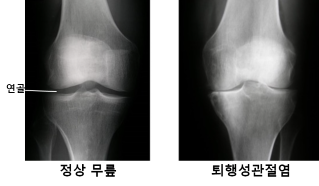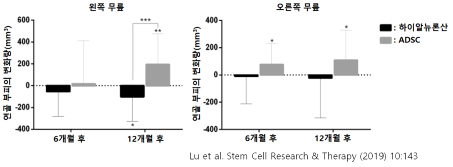08 Arthritis treatment using adipose stem cells
페이지 정보

본문
1. What is degenerative arthritis?
It refers to a disease in which the cartilage that protects the joint at the end of the bone is damaged or changes degeneratively, damaging the bones and ligaments that make up the joint, resulting in inflammation and pain. You can easily tell by looking at the X-RAY photo. In the X-RAY picture, the white part is bone and the black part between the white parts is cartilage. In normal people's knees, the cartilage area is thick, but in patients with degenerative arthritis, the cartilage area is very thin, so you can see that the two bones are almost connected.
This wearing away of cartilage is a typical characteristic of degenerative arthritis. Some people are confused, but rheumatoid arthritis and degenerative arthritis are completely different diseases. Rheumatoid arthritis is a type of autoimmune disease.
2. Why does degenerative arthritis occur?
The typical cause is aging. If you use your joints a lot for a long time, the cartilage wears out, causing degenerative arthritis. This fact can be confirmed by the fact that the frequency of occurrence of degenerative arthritis is proportional to age, and that worldwide, 9.6% of male seniors and 18% of female seniors over 60 years of age suffer from degenerative arthritis.
However, recent research results suggest that the causes of degenerative arthritis

are diverse, as revealed in U.S. statistics that out of the total 15 million patients with degenerative arthritis, about 1.7 million are under the age of 45, which appears to be unrelated to overuse of joints. there is. First, it is claimed that degenerative arthritis occurs due to an inflammatory response. According to this study, the inflammatory response caused by IL-1, a type of cytokine, plays a major role in the development of degenerative arthritis. Treatment with IL-1-RA, an inhibitor of IL-1 produced by white blood cells, reduces inflammation caused by IL-1. This means that degenerative arthritis can be treated by suppressing the reaction.
Another reason is that research shows that the regenerative ability of cartilage cells that produce joint cartilage almost disappears in people over 60 years old, making it impossible to maintain cartilage, leading to the development of degenerative arthritis.
Lastly, research results have also been published showing that degenerative arthritis occurs because proteolytic enzymes are secreted and destroy damaged cartilage.
3. How do you treat degenerative arthritis with stem cells?
It's simple. Simply inject the stem cells directly into the joint.
Stem cells used to treat degenerative arthritis may be uncultured SVF or cultured adipose stem cells (ADSC). In fact, both are used clinically and there is no significant difference in effectiveness.
4. What are the effects of treating degenerative arthritis with stem cells?
Summarizing the research results published so far, symptoms of degenerative arthritis can be improved by up to 70% with one treatment, and the effect lasts for up to two years after joint injection. The cartilage in joints injected with adipose stem cells no longer wore away during the study period, and many results showed cartilage regeneration as presented.

Cartilage regeneration is very important in that it can fundamentally treat and completely cure degenerative arthritis. Of course, not all patients showed the same degree of symptom improvement. Many patients showed symptom improvement of less than 20%. However, since most research results examined the effects for 1 to 2 years after the initial 1 to 2 injections of fat stem cells, it seems important to investigate the effects by increasing the number of fat stem cell injections.
5. Are there any side effects from stem cell treatment?
After stem cell injection, joint pain or swelling may temporarily increase. However, it can be said to be a very safe procedure in that these side effects are all resolved within a week without any special treatment.
It refers to a disease in which the cartilage that protects the joint at the end of the bone is damaged or changes degeneratively, damaging the bones and ligaments that make up the joint, resulting in inflammation and pain. You can easily tell by looking at the X-RAY photo. In the X-RAY picture, the white part is bone and the black part between the white parts is cartilage. In normal people's knees, the cartilage area is thick, but in patients with degenerative arthritis, the cartilage area is very thin, so you can see that the two bones are almost connected.
This wearing away of cartilage is a typical characteristic of degenerative arthritis. Some people are confused, but rheumatoid arthritis and degenerative arthritis are completely different diseases. Rheumatoid arthritis is a type of autoimmune disease.
2. Why does degenerative arthritis occur?
The typical cause is aging. If you use your joints a lot for a long time, the cartilage wears out, causing degenerative arthritis. This fact can be confirmed by the fact that the frequency of occurrence of degenerative arthritis is proportional to age, and that worldwide, 9.6% of male seniors and 18% of female seniors over 60 years of age suffer from degenerative arthritis.
However, recent research results suggest that the causes of degenerative arthritis

are diverse, as revealed in U.S. statistics that out of the total 15 million patients with degenerative arthritis, about 1.7 million are under the age of 45, which appears to be unrelated to overuse of joints. there is. First, it is claimed that degenerative arthritis occurs due to an inflammatory response. According to this study, the inflammatory response caused by IL-1, a type of cytokine, plays a major role in the development of degenerative arthritis. Treatment with IL-1-RA, an inhibitor of IL-1 produced by white blood cells, reduces inflammation caused by IL-1. This means that degenerative arthritis can be treated by suppressing the reaction.
Another reason is that research shows that the regenerative ability of cartilage cells that produce joint cartilage almost disappears in people over 60 years old, making it impossible to maintain cartilage, leading to the development of degenerative arthritis.
Lastly, research results have also been published showing that degenerative arthritis occurs because proteolytic enzymes are secreted and destroy damaged cartilage.
3. How do you treat degenerative arthritis with stem cells?
It's simple. Simply inject the stem cells directly into the joint.
Stem cells used to treat degenerative arthritis may be uncultured SVF or cultured adipose stem cells (ADSC). In fact, both are used clinically and there is no significant difference in effectiveness.
4. What are the effects of treating degenerative arthritis with stem cells?
Summarizing the research results published so far, symptoms of degenerative arthritis can be improved by up to 70% with one treatment, and the effect lasts for up to two years after joint injection. The cartilage in joints injected with adipose stem cells no longer wore away during the study period, and many results showed cartilage regeneration as presented.

Cartilage regeneration is very important in that it can fundamentally treat and completely cure degenerative arthritis. Of course, not all patients showed the same degree of symptom improvement. Many patients showed symptom improvement of less than 20%. However, since most research results examined the effects for 1 to 2 years after the initial 1 to 2 injections of fat stem cells, it seems important to investigate the effects by increasing the number of fat stem cell injections.
5. Are there any side effects from stem cell treatment?
After stem cell injection, joint pain or swelling may temporarily increase. However, it can be said to be a very safe procedure in that these side effects are all resolved within a week without any special treatment.
- PrevTreatment of lung disease by ADSC 24.04.16
- NextTreatment of liver disease by ADSC 24.04.16
댓글목록
등록된 댓글이 없습니다.






 +82-2-532-2856
+82-2-532-2856 info@panacellbio.com
info@panacellbio.com 521, Teheran-ro, Gangnam-gu, Seoul, Republic of Korea
521, Teheran-ro, Gangnam-gu, Seoul, Republic of Korea